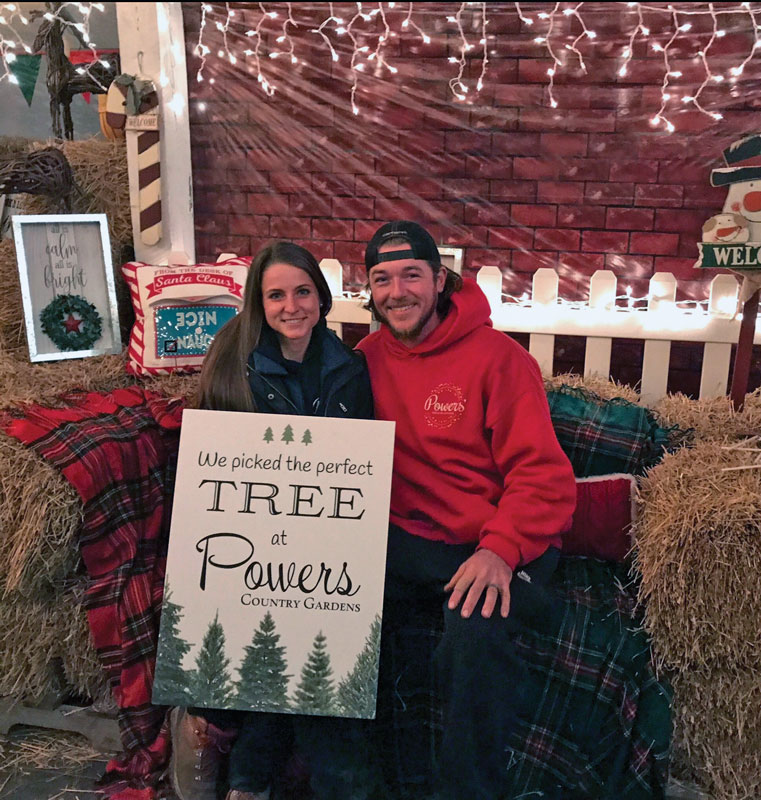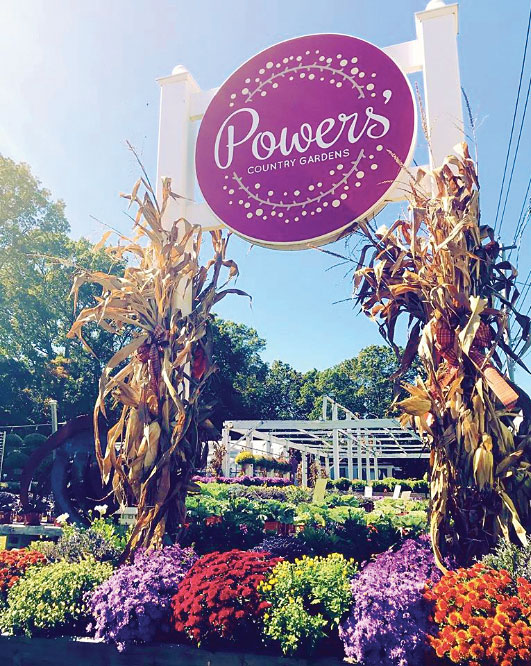3/1/2020
Labor of Love
Allison Westbrook

Corinne Dodge came to horticulture in a round-about way, as many plant people do—she was pursuing an undecided major at Farmingdale State College where she met her future husband James Powers, whose parents happened to be growers. She fell in love—with him and with the business of plants. Now her retail business isn’t just surviving, but thriving, with sales steadily increasing each year.
Learning, listening and refining
Corinne holds a degree in Professional Communication, with minors in Business and Horticulture, which she pursued with the goal of becoming a business owner. She worked at his parents’ growing facility out of college, and while it was an interesting avenue, she and her husband discussed wanting to do something different within the horticulture industry.
Pictured: Corinne Dodge, owner of Powers’ Country Gardens.
Using their family’s wholesale platform to their advantage, they entered into the world of retail. In 2015, they found their retail location and opened Powers’ Country Gardens that Christmas. At that point, the property had been shut down for four years and was a disaster. They flipped the property in six days and opened their doors; now they’re entering into their fourth spring season.
Their retail shop offers a mix of plants, but Corinne says they turn over more annuals than anything else. While a majority of their spring sales come from annuals, perennials and shrubs, a large category for them is tropicals. They order in a couple of freight trucks consisting of palm trees, flowering mandevillas and foliage from Florida every spring season. They’re popular summertime items in Long Island and a large contributor to Mother’s Day sales.
Customers come from neighboring suburbs for hanging baskets and bedding plants for their yards, as well as houseplants and container plants for those with a smaller living spaces. They also sell seasonal items for spring/summer, fall and winter (Christmas). Throughout the past several years, they’ve fine-tuned their ordering, abandoning items that didn’t sell well and increasing revenue on other, more popular, items. Part of adjusting sales is listening to the community and understanding what the surrounding area needs.
“There’s trial-and-error for every season, but it’s necessary,” said Corinne.
A quality product is their main concern—consistent turnover and frequent ordering is important and helps keep fresh and healthy-looking plants available for purchase all season long.
Expanding the brand
Corinne is involved in every facet of the business: ordering, marketing, accounting, sales, events, reaching out to other wholesalers and retailers, watering, cleaning, and everything else.
“There’s always a job to be done—there’s a lot of behind-the-scenes work when it comes to being the owner,” she says. “It’s really a 365-job.”
With running a business that depends on holiday and seasonal sales, and has to work around the weather, Corinne knew she had to expand and implement other business strategies to boost sales dollars. Owning the property that they sell out of helps them explore different avenues to do just that. It’s important to “understand what square footage of the garden center makes money and what we can do to increase revenue in the areas that don’t,” said Corinne.
This year, they fenced off a section of their garden center and rented it out to landscapers. While not looking to get into landscaping quite yet, this helps the business turn over more inventory, give referrals to customers and collect income during the slower winter months.
Another year-round sales item is propane. They have a large propane tank on their property and refill smaller tanks—typically homeowners’ barbeque tanks and tanks for forklifts.
 Online ordering is another focus of the business and also their biggest challenge. Corinne runs their retail website, which is updated regularly to feature the most popular items for each season. The main obstacle when it comes to online ordering is shipping and finding eco-friendly solutions. She explains how there are many platforms when it comes to shipping, like FedEx and UPS, but those options come with obstacles.
Online ordering is another focus of the business and also their biggest challenge. Corinne runs their retail website, which is updated regularly to feature the most popular items for each season. The main obstacle when it comes to online ordering is shipping and finding eco-friendly solutions. She explains how there are many platforms when it comes to shipping, like FedEx and UPS, but those options come with obstacles.
“The boxes tend to be overly expensive, filled with additional costs for packaging inserts, compounds to retain moisture and the lack of a guarantee that your plant will arrive in the same condition it left in,” Corrine said.
Pictured: Corinne Dodge and James Powers in their garden center’s winter wonderland.
All of these factors are put into consideration when finding a solution for her shipping challenges, but she’s hopeful to have a breakthrough this year. “We’re trying to tackle cost effectiveness while being aware of the effect shipping has on our economic footprint.”
Corinne says that online ordering is more than just a way to sell plants—it’s key for marketing. It’s about promoting the perception that your business is current and relevant, and gives the appearance that you’re a big player. There’s a lot of competition on Long Island, which is filled with garden centers and big box stores, almost all now selling plants. Part of that strategy also involves the use of social media—she says they’re on “all the big ones” and that it’s instrumental in drawing customers in. The online store generates traffic on the website, Instagram and Facebook.
Corinne says she can see the traction is there, even though the purchasing might not be to the level that they’re satisfied with.
“I think it still is a very touch-and-feel industry; a lot of people come in asking about plants that were featured in a recent post,” she explained. “People still want to get their hands on the item, see what the quality is and then they’re more trusting to order it online next time.”
During the month of December, they sell Christmas trees along with items like wreaths, roping and grave blankets. Another revenue-generating addition to their Christmas sales is weekend events. After receiving permits through New York State, they’re able to serve hard drinks for adults, and hot cocoa and desserts for kids. They’ve incorporated bonfire seating, themed music and multiple areas for family photos (which has the added bonus of free marketing for the garden center on social media). The greenhouse also gets transformed into a walk-through store with décor items and tree accessories.
 “I try to make our store an experience. It turns a seasonal purchase into a family memory,” she said.
“I try to make our store an experience. It turns a seasonal purchase into a family memory,” she said.
When imagining what a modern garden center could be, Corinne doesn’t necessarily follow all the industry standards—she’s dropped selling poinsettias and instead added flocking to Christmas trees.
“We believe in fine-tuning what actually makes you money. The retail crowd will follow,” she explained.
For the future, Corinne is looking to increase sales in the winter months by offering greenhouse workshops, seminars and “create-your-own nights.” Cooking is also another passion of Corinne’s.
“Anything that I can grow and cook with I want in my garden,” she stated.
Corinne wears many hats and all of her hard work has earned her much success in a short time, but she’s quick to note that a lot of the credit is due to her business partner and husband James.
“He’s the other half to this business and his relentless work ethic is why we’re successful today.” GT
Pictured: Powers’ Country Gardens in Long Island, New York.